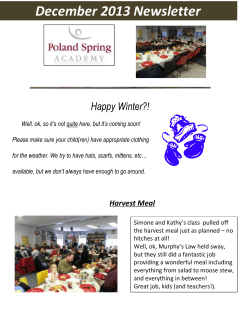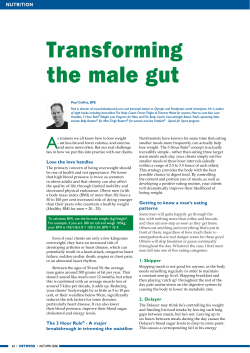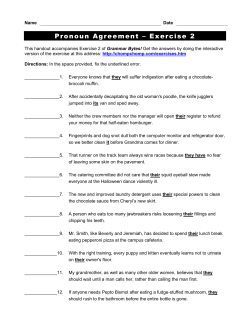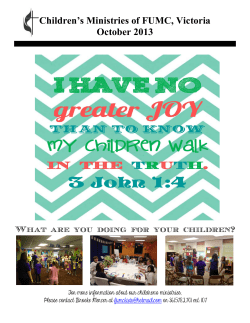
By Megan Shaw
Positive meal times in family day care By Megan Shaw Meal times provide great opportunities for developing children’s independence, social skills and teaching them about healthy eating. However, this routine can be particularly challenging in family day care, where one person is often required to meet the needs of individual children of varying ages and abilities. Carefully considering meal time routines, and planning them effectively can ensure that they are positive and rich learning experiences. Setting up the environment Encouraging self-help skills Consider the amount of space you have available in your meal area. Is there enough room for children to move around safely? Is furniture arranged so that traffic areas are free of clutter to prevent trip hazards and objects for children to run into? Ensure there is a space out of children’s reach to place hot items. If space allows, you may be able to position high chairs in the main meal area so that all children can be included and can interact during meal times. You may also consider taking the trays off the high chairs so that they can be moved closer to the meal table. This will also make it easier for you to assist younger children with feeding. If you do not have enough space indoors to allow for all children to be seated comfortably, consider setting up meal times outdoors. Meal times are a great time for children to practice their self-help skills. Children can assist with setting and clearing the table and serving food. Consider some of the following strategies to encourage children’s independence: Maintaining children’s routines Children may have different eating routines that will need to be staggered to meet their individual needs. For example, a young baby may require lunch earlier than an older child. This can potentially limit opportunities for interactions between yourself and children during meal times, as you aim to meet every child’s needs. You may be able to consider whether younger children could eat their lunch at the same time as older children’s morning tea. This would allow all children to be eating at the same time and provide an opportunity for you to interact with each child. Alternatively, quieter, passive activities for older children may be planned to occur during younger children’s meal times so that the older children can play in or near the same area as younger children when they are eating. If children require sleep or rest at different times of the day, try setting up the rest area early so children can move to this area when they finish eating. •P rovide a small jug so children can pour their own drinks • S erve fruit on a platter and provide small tongs for children to serve themselves • If children bring their food from home, encourage them to open their own containers, food packets and to unwrap their sandwiches • S upply a small bin for children to dispose of their rubbish or food scraps •P rovide a tub of soapy water for older children to rinse their dishes, or provide a safe stool for children to use at the kitchen sink •G ive babies an extra spoon so they can practice feeding themselves •E ncourage toddlers to help clean their faces and hands after meal times. It is important to remember that when children practice their independence, there are likely to be mishaps and spills. If this occurs, try not to make a fuss, but encourage the children to clean up the mess themselves. Keep cloths and soapy water nearby for children to access if they spill anything. Conversations during meal times Talking with children is important at all times of the day and meal times are a good time for social conversations between children, as well as for you to talk with children and to ‘catch up’ on what is happening in their lives. QIAS -FDCQA - Factsheet # 28 Always consider the aesthetics of your environment. If the eating area is appealing for children, the meal time is more likely to be pleasant and to run smoothly. Consider decorating the meal table with flowers, placemats and/or a table cloth. •E ncourage children to help set the table. Placemats may be created by the children, using pieces of artwork, photographs of the children and their families, or pictures of different foods. The placemats can also be labelled with children’s names. This will assist in children’s early reading development as they identify their own and other children’s placemats Meal times also provide natural opportunities to discuss nutrition with children. Encouraging children to eat healthy foods such as sandwiches and fruit before other snacks assists them to develop healthy eating habits. However, children should not be forced to eat as this can develop negative and unhealthy attitudes toward food. Explaining in simple language the benefits of healthy eating, while allowing children to choose how much they eat, will help to make meal times positive experiences. Including multicultural experiences in meal routines Meal routines provide many opportunities to learn about different foods and meal time practices. Children can experience foods from diverse cultures, particularly those of the children in care and the local community. Families may also be willing to share traditional recipes for children to cook and share. You can also consider celebrating important days and holidays that the children’s families celebrate, many of which involve traditional foods. Find out as much as you can from children and their families to ensure you understand the importance of their celebrations and the types of activities they participate in. Activity ideas using food Using food throughout your program can teach children about where food comes from and how it is prepared. Cooking experiences are also opportunities for children to practice mathematical and science concepts. Some simple ideas include: • If you have fruit trees or a vegetable garden, allow the children to help you pick the fruit and vegetables and use them for meals • Implement cooking experiences and support the children to measure, count, pour and mix the ingredients •A llow children to assist in preparing meals and planning menus. Children may choose their sandwich fillings and which fruit they would like to eat. • Involve children in excursions to shops to buy the ingredients for cooking experiences. Older children can practice their writing skills by preparing a shopping list, while younger children may be able to cut and paste pictures from magazines. Encourage children to assist with choosing the food items you need and discuss the nutritional value of the foods. Communicating with families Families often like to know what their children have eaten during the day. This is often particularly important for maintaining consistency between family day care and home, particularly for babies and younger children. While it may be appropriate to verbally describe what an older child has eaten to their family, it is often helpful to write this information down for parents of younger children. Conclusion Not only do quality meal time experiences help to ensure that children’s nutritional needs are being met, they also provide many opportunities for children to learn a broad range of skills. The learning that takes place during meal time routines can occur naturally and as part of a social occasion in which children are able to interact with each other and with you in a warm, unhurried and respectful atmosphere n Family Day Care Quality Assurance Principles: 1.1, 2.1, 3.4, 4.1 and 4.2 References and further reading • Department of Health and Ageing. (2009). Get up & Grow: Healthy Eating and Physical Activity for Early Childhood. Canberra: Author. • Royal Children’s Hospital – Nutrition and Food Services Department. (2009). Childcare and healthy eating. Retrieved 2 December, 2009, from http://www.betterhealth.vic.gov.au/bhcv2/bhcarticles.nsf/pages/Childcare_and_healthy_eating?open • Ryan, S. (2005). Making mealtimes pleasant. Iowa Department of Public Health, National Network for Child Care. Retrieved 2 December, 2009, from http://www.nncc.org/Nutrition/mak.meal.pleas.html • Shaw, M. (2009). Making meal times positive. Putting Children First, 32, 18-19. Useful websites • Start Right Eat Right, South Australia: www.health.sa.gov.au/pehs/startrighteatright.htm • Go For Your Life: www.goforyourlife.vic.gov.au/kids For more information on FDCQA please contact a NCAC Child Care Adviser. Telephone: 1300 136 554 or (02) 8260 1900 E-mail: qualitycare@ncac.gov.au Level 3, 418a Elizabeth St Surry Hills NSW 2010 www.ncac.gov.au © Australian Government 2010. This factsheet may be reproduced by family day care schemes for the purpose of information sharing amongst staff and families. At all other times written permission must be obtained from NCAC.
© Copyright 2025





















